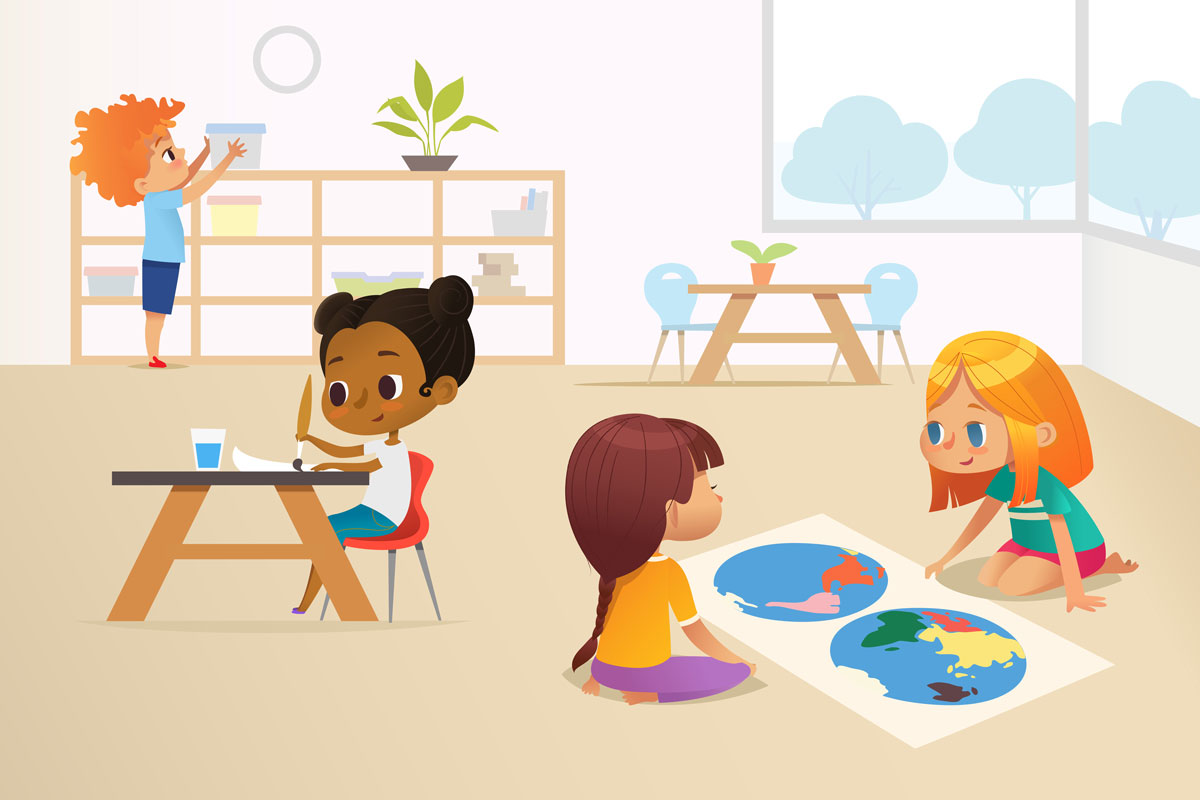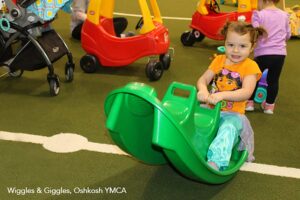Having a child who is able to do as much for themselves as possible is definitely an asset to smoother daily functioning in any family, but what does that actually look like and how do you get there? Truth be told, children innately love autonomy and responsibility, but finding what is developmentally and emotionally appropriate can be the tricky part. Be not afraid! We’ve compiled some tried and true ideas and tips to help foster your little one’s confidence in independence.
When we think about child independence we want to start basic and move toward the complex. With babies, we begin with sleeping, feeding, drinking and then move into basic self-care tasks, such as dressing and toileting, with toddlers. As we think about preschoolers and school-age children we work toward mastery in self-care and increased independence with household tasks, such as meal preparation, and then into the community environments of school, church, etc. Don’t overthink it! Your child will show you just what exactly he or she is interested in at the moment and following the child’s lead is a great way to work toward respectful and harmonious independence in your home and beyond.
As you move through these developmental milestones and stages, keep in mind, sometimes when a child wants help even though they can do something, your assistance is a reminder to them that they are loved. For example, your child might ask for helping to brush his teeth or scooping up food on her fork when that milestone has long since been achieved. At that moment, a child may just want to feel your love in helping them with the task. Don’t worry! This is not a regression but a reinforcement of your trust and lasting bond. If your family or child is in the midst of any major adjustment, such as moving, starting school, or adding a new member, these needs for extra TLC are especially common and normal.
Our role as parents is not to push our children but rather to observe them and provide the just-right opportunities for them to be independent as they are ready. For example, if you notice your child is interested but hesitant about learning two-wheeled bicycling, set aside 15 minutes a day to work on mastering the skill. If he/she is truly ready, the progress toward success will be swift and steep. If he/she is not quite there yet, you’ll see more frustration and abandoning the bike for other activities. We are looking for a just-right challenge: not too hard and not too easy. If we continue to challenge our children toward healthy independence, we will enrich their childhood experiences and give them the gifts of security, confidence, and a reasonable amount of self-sufficiency (because we all need to know when to reach out for help) that will benefit them over a lifetime!
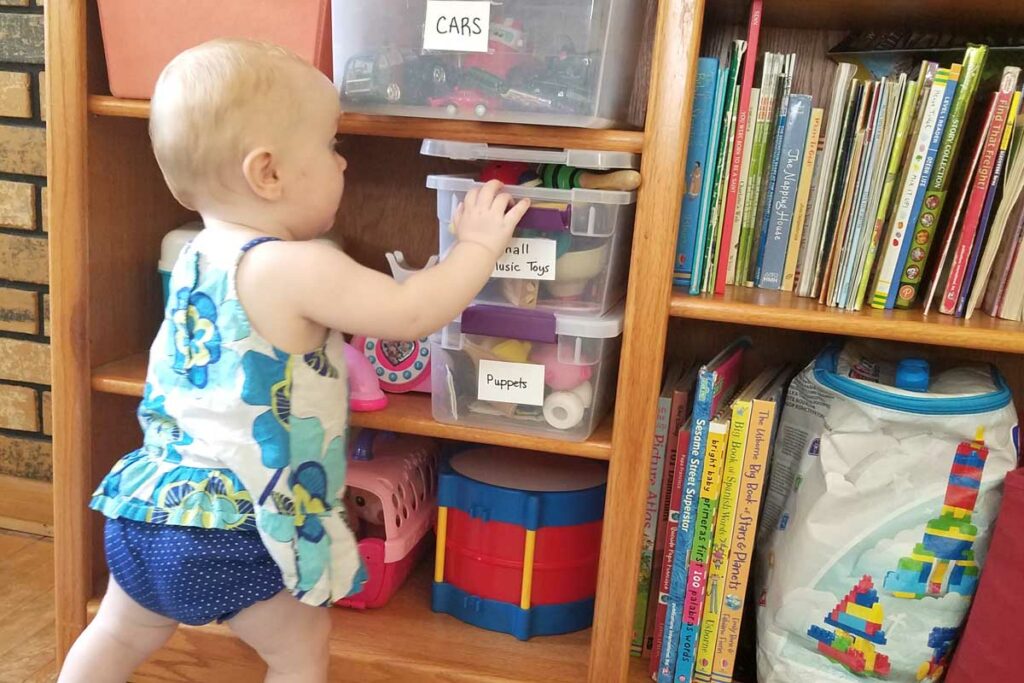
Zero to One Year Old
Babyhood primarily focuses on the basics of eating, drinking, and sleeping. Not all families and cultures have the same expectations for independence in these years, so keep this in mind when you’re finding the right fit for your family.
Feeding
As your baby begins to eat solid foods, consider baby-led-weaning, an approach focused on baby’s self-feeding, versus spoon-fed meals. Your baby wants to do what your bigger children are doing! Offer your baby a sippy cup or cup with a straw that he/she can navigate independently. Another great way to foster mealtime independence is to teach your baby some basic signs. For example, teaching a baby the sign ‘more’ and ‘all done’ or even ‘water’ helps communicate his/her needs and also help baby to learn ‘am I still hungry?’
Movement
Set up your home environment for success and movement! Set out toys for baby to reach that encourage pulling up to stand, crawling, walking, etc. Try to set up a safe environment where you feel confident letting baby roam and explore. This is the age of baby jails! Go for zippered-in trampolines (free of larger jumping children) where babies can move and explore in a safe space while you take care of household tasks.
Sleep
When it comes to sleep routine, consistency, and predictability are essential. Be willing to work on sleep independence over many months and years with your baby. While adequate sleep is highly coveted by a new parent, you want to also ensure you establish trust and reliability for the child, and this definitely takes time. Consider the pluses and minuses of room sharing with parents and/or siblings. Establish a nap and nighttime routine that you can commit to and your baby will quickly learn that it signals sleep time. Include your baby in your family community: bedtime stories, bath time/massage, prayer time, and other family rituals to help signal sleep for all.
Babies are quite intelligent and learn quickly how ‘life’ is supposed to happen. If you find yourself running into huge battles with sleep or other baby independence, perhaps waiting is the best solution until baby is more developmentally and emotionally ready. Fostering independence is both about finding what is sustainable for you as a parent and also what is appropriate and respectful toward your child at his/her age.
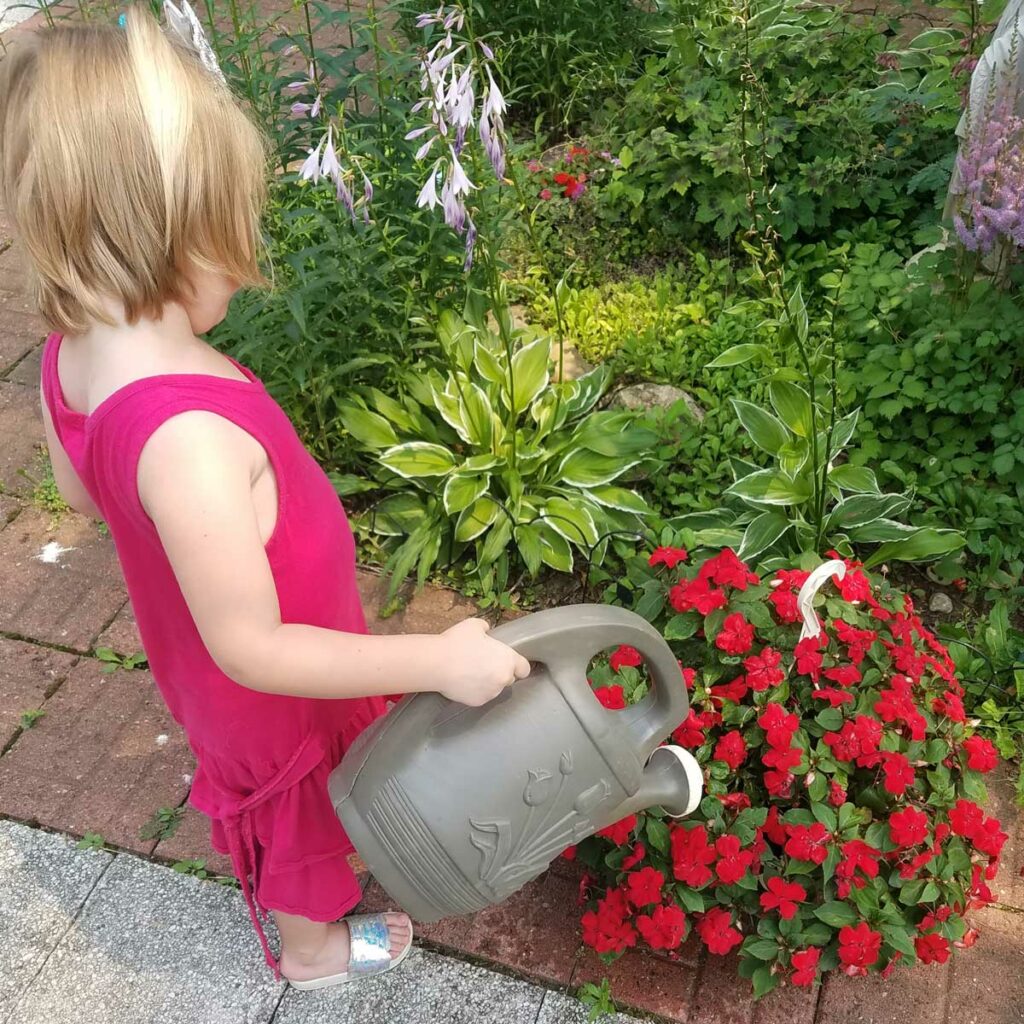
Two to Three Years Old
In this stage, you will want to focus on basic self-care tasks and safety with your toddler. Now is a great time to teach your child independence with dressing, some parts of bathing, grooming, etc. You’ll want to pick easy clothing: Velcro or slip-on shoes, pull-over shirts and pants vs. buttons/zippers, etc. Your child will begin to show signs of independence with toileting. For a child in diapers, consider a switch to pull-ups for increased independence.
Set up your child’s home environment so that what you want him/her to access (toys, books, today’s outfit) is at eye height. Give your child choices! Set out two snacks to pick from. Consider creating a snack bin where all items are a great choice. Your child can begin to help you with simple daily living tasks as well. One great place to start is to think about areas in which your child can apprentice, or practice skills alongside your work, and slowly gain competency with the end goal of eventual mastery of the skill.
For example, your 2-3 year old child can be your apprentice in the following daily tasks:
- shower
- laundry
- pack a lunch or prepare a snack
- clean surfaces
- watering plants/gardening
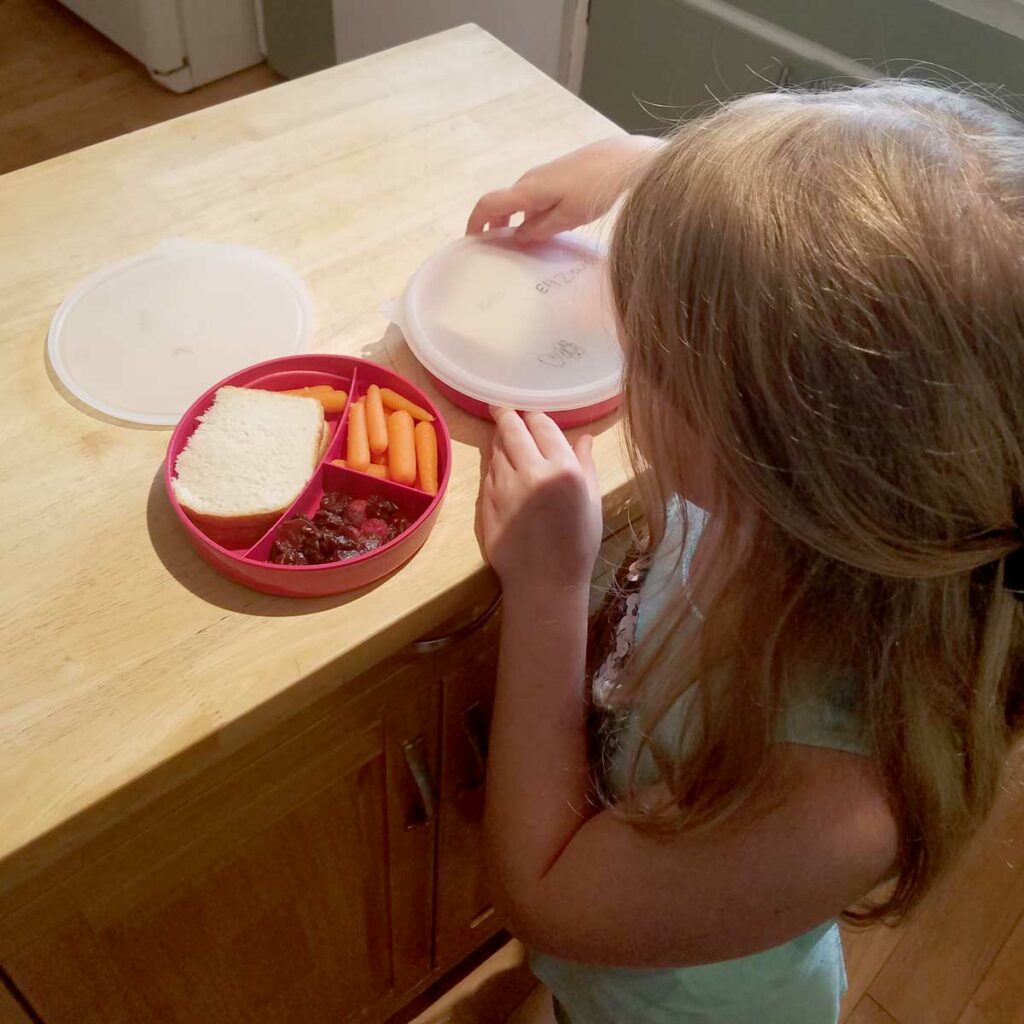
Four to Five Years Old
Children in this stage are ready to focus on more challenging self-care skills. Focus on supervising and providing verbal reinforcement vs. completing these cares for your children. Teach your child basic number or clock-reading skills so he/she can know when it is wake time, bedtime, etc. If your little one is transitioning out of nap time, consider beginning a quiet reading or resting time. This is a great time to use quiet toys (legos, puzzles, audiobooks).
Engage your child in setting up his or her room environment! Consider all of the activities that are essential or important for each day and allow your child to be as independent as he/she can responsibly handle, e.g. setting out the outfit for the next day. Children of this age do great with working toward rewards via charts, coupons, or other systems if you need to provide motivation. Social and play opportunities are great motivators here! Now is also an excellent time to begin teaching basic money skills, e.g., paying with cash for a toy at the Dollar Store, with your child.
Your 4-5 year old child can apprentice in the following tasks:
- following recipes to prepare a snack or small meal
- getting the mail
- mopping
- basic home maintenance (ex: using a screwdriver to assemble a side table)
- time literacy
- pet care
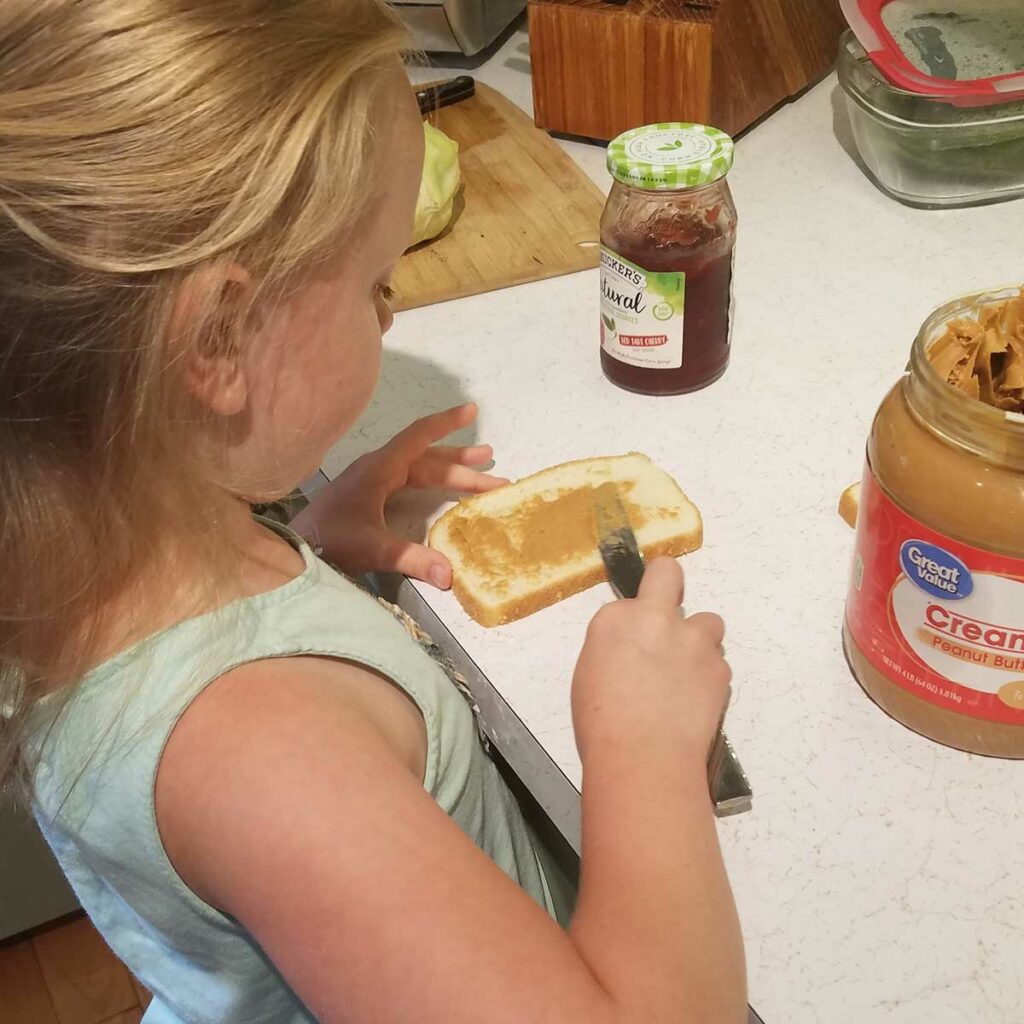
Six to Eight Years Old
Children in the early school years have mastered most of their self-care tasks and can begin focusing on higher-level home tasks and roles that reach into the community. This is a great age to begin helping with basic sibling care tasks and some basic meal preparation/cooking and repairs around the house. Children in this stage also love projects and planning, such as organizing and executing a lemonade stand or planning the details of a birthday party or meal. Include your child in helping to establish his/her daily routine and schedule so that he/she can begin to consider what activities are of priority in your family culture.
Children in this age need a rich home environment (inside and outside) along with appropriate opportunities to engage with others in the community, e.g. swimming lessons, volunteering alongside a parent, etc. In this stage, children are becoming increasingly socially aware and motivated. Learning important social negotiation skills are essential here, so make sure your child has frequent access to trusted circles of children to learn alongside. You can help in this process of learning social skills by asking relevant questions, such as ‘how did playing with the neighbor go this afternoon?’ ‘Was he/she good to you? Was there anything that made you feel sad or uncomfortable?’ Let your child know you are invested in him/her and available whenever needed to talk through it all.
Your 6-8 year old child can apprentice in the following tasks:
- money management (ex: budgeting for and purchasing an item at a store)
- time management
- shop for/make a recipe
- painting projects
- helping to put together small home maintenance/mechanical projects (ex: help with swing set)
- conflict management
- basic sibling care (ex: prepare a bottle or a snack)
- plan a birthday or holiday party
Fostering independence is both an exciting and sometimes challenging role as a parent. Be gentle with yourself and your child as you move along the various stages. Regressions are common, but in the end, children do overall move toward greater independence with each stage of their life. Being your child’s guide toward adulthood is an important and rewarding responsibility of parenting, and we hope this guide will empower you with the tools to lovingly lead your child along that journey as he/she is ready. You’ve got this!

